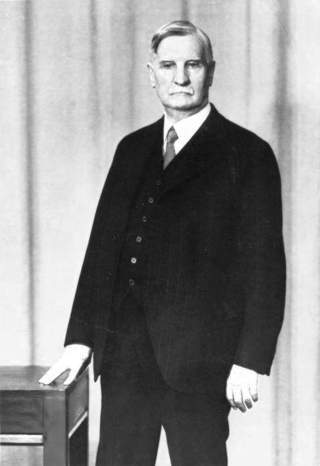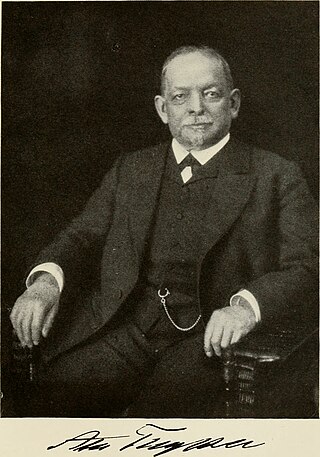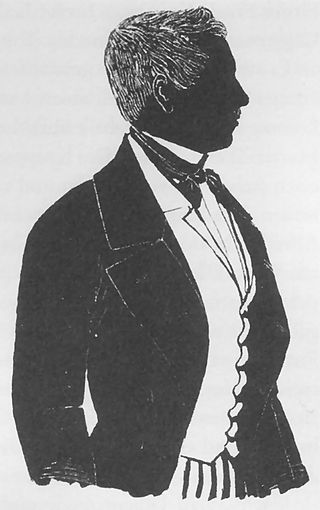
The Krupp family is a prominent 400-year-old German dynasty from Essen, noted for its production of steel, artillery, ammunition and other armaments. The family business, known as Friedrich Krupp AG, was the largest company in Europe at the beginning of the 20th century, and was the premier weapons manufacturer for Germany in both world wars. Starting from the Thirty Years' War until the end of the Second World War, it produced battleships, U-boats, tanks, howitzers, guns, utilities, and hundreds of other commodities.

ArcelorMittal Dofasco is a steel company based in Hamilton, Ontario, Canada. Dofasco is a standalone subsidiary of ArcelorMittal, the world's largest integrated steel producer.

Gothaer Waggonfabrik was a German manufacturer of rolling stock established in the late nineteenth century at Gotha. During the two world wars, the company expanded into aircraft building.

ThyssenKrupp AG is a German industrial engineering and steel production multinational conglomerate. It resulted from the 1999 merger of Thyssen AG and Krupp and has its operational headquarters in Duisburg and Essen. The company claims to be one of the world's largest steel producers, and it was ranked tenth-largest worldwide by revenue in 2015. It is divided into 670 subsidiaries worldwide. The largest shareholders are the Alfried Krupp von Bohlen und Halbach Foundation and Cevian Capital. ThyssenKrupp's products range from machines and industrial services to high-speed trains, elevators, and shipbuilding. The subsidiary ThyssenKrupp Marine Systems also manufactures frigates, corvettes, and submarines for the German and foreign navies.

The Budd Company was a 20th-century metal fabricator, a major supplier of body components to the automobile industry, and a manufacturer of stainless steel passenger rail cars, airframes, missile and space vehicles, and various defense products.

Edward Gowen Budd was an American inventor and businessman.

August Thyssen was a German industrialist, founder and controlling shareholder of Thyssen & Co. He was a prominent member of the Thyssen family.

Friedrich Carl Krupp was a German steel manufacturer and founder of the Krupp family commercial empire that is now subsumed into ThyssenKrupp AG.

Thyssen was a major German steel producer founded by August Thyssen. The company merged with Friedrich Krupp AG Hoesch-Krupp to form ThyssenKrupp in 1999.

The Vereinigte Stahlwerke AG was a German industrial conglomerate producing coal, iron, and steel in the interbellum and during World War II.

The Eisenbahn und Häfen GmbH is a service company providing rail transportation and associated storage as well as operating the Rhine ports of Schwelgern and Walsum-Süd.
Otto Wolff AG was a German steelmaker founded in Cologne by the industrialists Otto Wolff and Ottmar E. Strauß in 1904. One of the largest businesses in pre-war Germany, it exists today as an independent subsidiary of the ThyssenKrupp group.

The Ford Taunus G93A is a small family car that was produced by Ford Germany between 1939 and 1942 in succession to the Ford Eifel. It was the first car developed at Cologne by Ford Germany which previously had built cars originated by Ford businesses in the US or the UK. Production began on 30 April 1939, with the first car exhibited to the public in June 1939, less than six months before the outbreak of war in Europe.

Gestamp Automoción, S.A. simply known as Gestamp is a Spanish multinational automotive engineering company. It is one of leading firms in the European automotive industry.

The Adler Trumpf Junior is a small family car introduced by the Frankfurt based auto-maker Adler, early in 1934. Trumpf Junior was conceived as a similar but smaller version of the Adler Trumpf, which had already been available for two years. It intended to broaden the range and claim a share of a growing market which DKW were creating with their F1 model, and its successors, for small inexpensive front wheel drive cars.

The Citroën B10 is an automobile produced by Citroën at André Citroën's factory in central Paris between 1924 and 1925.
Briggs Manufacturing was an American, Detroit-based manufacturer of automobile bodies for Ford Motor Company, Chrysler Corporation and other U.S. and European automobile manufacturers.

VDM Metals Group based in Werdohl, Germany, is a manufacturer of corrosion-resistant, heat-resistant and high-temperature nickel alloys, cobalt and zirconium alloys as well as high-alloyed special stainless steels. These materials are used in the chemical process industry, the oil and gas industry, aerospace, automotive and electronics / electrical engineering. VDM Metals operates production sites in Germany and the United States. The company employs about 2,000 people worldwide.

Arthur Müller was a German entrepreneur and inventor. He became known as the founder and director of the "Deutsche Flugplatz Gesellschaft", which instigated, built and then operated the "Motorflugplatz Johannisthal-Adlershof", Germany's first commercial airfield.

The Krupp steelworks, or Krupp foundry, or Krupp cast steel factory in Essen is a historic industrial site of the Ruhr area of North Rhine-Westphalia in western Germany that was known as the "weapons forge of the German Reich".


















